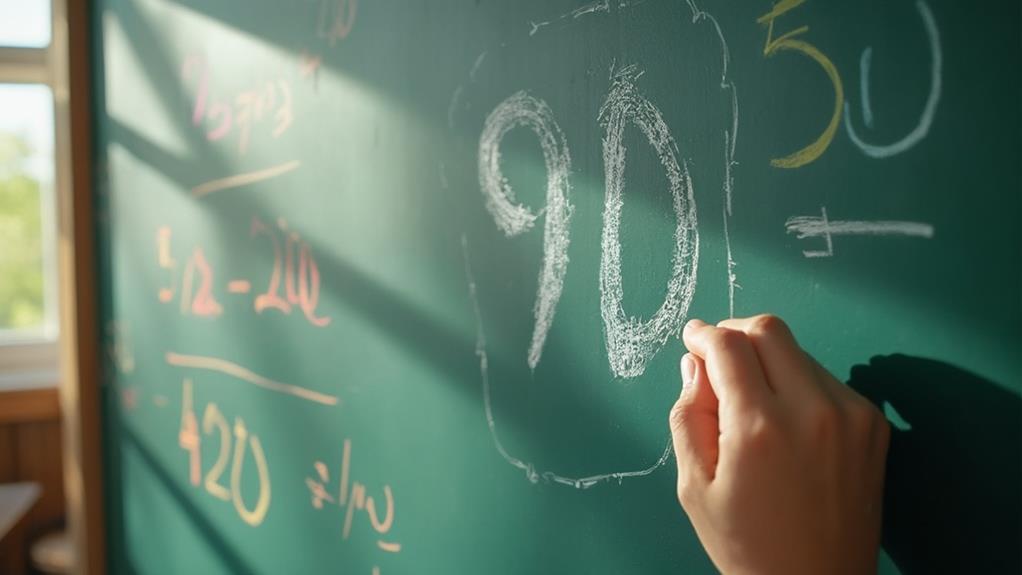You might not know that the correct spelling of the number 90 is "ninety," not "ninty." This common mistake often trips people up, but understanding the simple rule can help you avoid it. By focusing on the place value—where 9 is in the tens place and 0 in the ones—you can spell it correctly every time. Let's explore some practical tips and exercises that not only clarify this but also guarantee you communicate accurately in various contexts. Ready to enhance your spelling skills?
Writing 90 in Words
Recognizing the place value is fundamental. In 90, the tens place holds the value of 9, signifying nine groups of ten, while the ones place holds a value of 0, indicating no additional units. This understanding guarantees you articulate and write numbers correctly, thereby avoiding common errors like "Ninty."
Writing numbers in words, especially "Ninety," isn't only about correctness but also about versatility. Whether you're discussing quantities, percentages, or age, employing the word "Ninety" can enhance clarity and understanding.
Your ability to accurately convert numbers into words fosters a sense of belonging within a community that values precise communication and mutual understanding. By mastering this skill, you contribute to clearer and more effective exchanges in various settings.
Mathematical Properties
When examining 90's mathematical properties, you'll notice it's an even and composite number, meaning it's divisible by 2 and has multiple factors beyond 1 and 90 itself.
Specifically, its prime factorization is 2 × 3² × 5.
Additionally, the square root of 90 is about 9.486833, indicating it isn't a perfect square.
Even and Composite Nature
Known for its distinct mathematical properties, the number 90 stands out as an even and composite number. As an even number, 90 is divisible by 2 without any remainder, a fundamental characteristic that places it within a specific subset of integers. This divisibility by 2 underscores its inherent symmetry and balance, traits often valued in numerical analysis and mathematical applications.
Equally important is 90's classification as a composite number. A composite number is defined by its ability to be divided by integers other than 1 and itself. For 90, this means it has multiple factors, contributing to its rich mathematical structure.
The factors of 90 include:
- Prime Factorization: The prime factors of 90 are 2, 3, and 5, expressed as 2 × 3² × 5.
- Sum of Digits: The sum of the digits in 90 (9 + 0) equals 9, which is divisible by 3, reinforcing its composite nature.
- List of Factors: The number 90 has several factors: 1, 2, 3, 5, 6, 9, 10, 15, 18, 30, 45, and 90 itself.
These properties affirm 90's place as a significant number in mathematical discussions, resonating with those who appreciate numerical intricacies.
Square Root Calculation
Calculating the square root of 90 reveals intricate details about its mathematical properties. When you compute the square root, you find it's approximately 9.486833, which clearly shows that 90 isn't a perfect square. This value, though not whole, gives you insight into the nature of 90 as a product of prime factors: \(2 imes 3^2 imes 5\).
Understanding this prime factorization helps you see why the square root is irrational. Since 90 includes the prime number 2 and the squared prime 3, the square root can't be simplified into an integer. Additionally, the sum of the digits in 90 (9 + 0) equals 9, confirming its divisibility by 3, a fact useful for various divisibility rules.
Moreover, 90's even composite nature means it has multiple factors: 1, 2, 3, 5, 6, 9, 10, 15, 18, 30, 45, and 90 itself.
Geometrically, 90 degrees is essential as it represents a right angle, a fundamental concept in geometry and trigonometry. By exploring these properties, you gain a deeper appreciation for the value and significance of 90 in both arithmetic and geometric contexts.
Basic Arithmetic
When working with ninety in basic arithmetic, you'll find that both addition and subtraction offer straightforward results.
For example, adding 70 and 20 or 50 and 40 will both give you ninety, while subtracting 40 from 90 results in fifty.
These operations illustrate how ninety can be easily manipulated using fundamental mathematical principles.
Subtraction With Ninety
Understanding subtraction with ninety, especially in basic arithmetic, is vital for building a solid mathematical foundation. When you subtract numbers from ninety, you engage in fundamental arithmetic operations that are important for more advanced mathematical concepts.
Let's explore some examples to solidify your understanding.
- Subtracting 40 from 90: When you take 40 away from 90, the result is 50. This illustrates a straightforward subtraction equation: 90 – 40 = 50.
- Subtracting 10 from 90: By subtracting 10 from 90, you get 80. This simple calculation shows how easy subtraction with the number ninety can be: 90 – 10 = 80.
- Subtracting 90 from 90: When you subtract ninety from ninety, the outcome is zero. This is an excellent example of the concept of subtraction leading to zero: 90 – 90 = 0.
In each instance, ninety serves as the minuend, the number you're subtracting from, while the number you subtract is called the subtrahend.
Understanding these terms and practicing with various examples will guarantee you grasp subtraction with ninety thoroughly, providing a foundation that's both solid and indispensable.
Addition Involving Ninety
Adding ninety to other numbers is a fundamental arithmetic operation that enhances one's mathematical proficiency. When you add ninety to any number, it increases that number by ninety. For instance, 90 + 10 equals 100. This operation is as straightforward as any basic addition.
Consider the sum of 90 and 50, which yields 140 (90 + 50 = 140). This example shows how simple it's to perform addition with ninety. Similarly, when adding 90 and 20, you arrive at 110 (90 + 20 = 110). Such calculations are easily verifiable through basic arithmetic principles.
An interesting instance of adding ninety involves doubling the value, as seen in 90 + 90, which equals 180. This illustrates not just addition, but also the concept of doubling a number.
Understanding how to add ninety in various contexts reinforces your basic arithmetic skills. Whether you're calculating totals or budgeting, mastering the addition of ninety is invaluable.
Common Spelling Mistakes
Understanding common spelling mistakes is vital for effective communication. Here are three common pitfalls:
- Spelling "ninety" as "ninty": This is a non-recognized word in English, and it disrupts clarity in writing.
- Confusing "ninety" with "ninetieth": The former indicates quantity, while the latter denotes position.
- Mispronunciation leading to misspelling: Incorrect pronunciation can cause the misspelling of "ninety," affecting your credibility.
Mastering the correct spelling of numbers like "ninety" is important for clear, written communication.
By avoiding these common mistakes, you enhance your writing's precision and guarantee your message is understood.
Usage Examples
Incorporating the correct spelling of "ninety" in your writing guarantees clarity and precision. For instance, when you write, "Ninety students attended the workshop," you're clearly indicating the specific quantity of participants. This avoids confusion and guarantees that your audience understands exactly what you mean.
When used in formal writing, it's often best to spell out numbers like ninety, especially if they begin a sentence, to maintain a professional tone.
Moreover, using "ninety" correctly in contexts such as percentages is vital. Consider the sentence, "Ninety percent of the participants completed the survey." Here, the correct spelling underscores the importance of the statistic, providing a precise and accurate portrayal of the data.
Avoiding the incorrect spelling "ninty" is paramount, as it isn't recognized in English and can lead to misunderstandings.
Additional Resources
Mastering the correct spelling of "ninety" extends beyond writing and into resources that can support consistent accuracy. Leveraging additional resources guarantees you can spell this commonly used number flawlessly. Here are three effective tools to contemplate:
- Educational Apps: Platforms like BYJUS offer interactive lessons tailored to enhance your understanding of spelling numbers. These apps often include engaging activities that make learning the spelling of "ninety" enjoyable and memorable.
- Math Worksheets: Utilizing math worksheets provides ample practice opportunities. By repeatedly writing numbers in words, you reinforce your learning. This repetition is vital in avoiding common mistakes like "ninty."
- Grammar and Spell-Check Tools: Modern writing tools with grammar and spell-check features can be invaluable. These tools not only correct spelling errors but also help you learn from your mistakes, guaranteeing that you consistently spell "ninety" correctly.
In addition to these, visual aids and curriculum resources are available to assist with comprehension. Online tutorials offer continuous learning opportunities, fostering mastery of spelling numbers in words.
Frequently Asked Questions
Is 90 Spelled Ninty or Ninety?
You're wondering about "ninty vs ninety," right? The correct spelling is "ninety." Common misspellings, like "ninty," often happen due to phonetic confusion. Remember, tools like grammar checkers can help you avoid this mistake.
How Do You Spell 90 on a Check?
When writing checks, spell "90" as "Ninety" ascertaining clarity and prevent alterations. Always use proper capitalization and avoid abbreviations or numerals. For example, write "Ninety and 00/100" for a round number, guaranteeing accurate numerical representation.
How Do You Spell 90 in Words?
Think of number spelling as painting a picture with words. You spell 90 as "Ninety." This numeric representation highlights the 9 in the tens place and 0 in the units place, ensuring clarity and precision.
How Do You Spell 90TH in Words?
You spell 90th as "ninetieth." For your 90th celebration, remember to use the correct ordinal numbers. "Ninetieth" combines "nine" with "-tieth," aligning with other ordinals like "twentieth." Avoid the incorrect "nintyeth" spelling.







